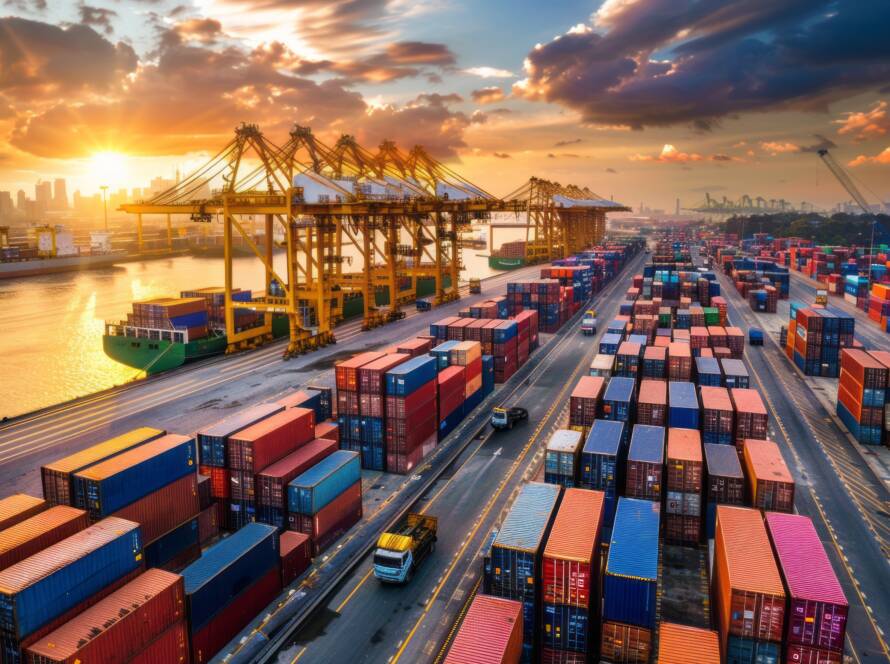With Donald Trump’s 2024 U.S. presidential win, global industries are gearing up for new policies and changes. He’s known for his “America First” approach and his presidency affected international trade through tariffs, energy policies and diplomatic strategies that rippled across the supply chain. This blog by Sharp Blue looks at how a second term will shape global shipping, from tariffs and energy to geopolitics and infrastructure.
1. Tariffs and Trade Wars: Global Shipping Challenges
Impact on International Trade Flows: One of the hallmarks of Trump’s first term was his focus on tariffs, especially with China, where he imposed tariffs on over $500 billion worth of Chinese goods. In a second term, this could be repeated or even expanded to other regions, particularly Europe and emerging markets. Global shipping companies will face disruptions in trade routes, goods will get more expensive with higher tariffs. Logistics companies, especially those on Asian and European routes, will experience delays as customs procedures get more complicated and the cost of goods go up.
Re-Aligning Global Trade: Trump’s administration forced businesses to re-examine their global supply chains and many moved production out of China to Vietnam, India and Mexico. If these policies continue, global shipping routes will get more diversified. For logistics companies, this means opportunities and challenges. They will have to adapt to new regional networks and manage the complexities of emerging markets. Port congestion will decrease in traditional hubs like Shanghai but increase in regions like Southeast Asia and Central America.
2. Energy Policy: Fuel for Global Shipping Stability
Impact on Shipping Costs: Trump’s push for US energy independence by increasing domestic oil and gas production will lower fuel prices. Shipping companies worldwide, especially those that operate international freight across long distances, are very sensitive to fuel prices. A stable and potentially lower US energy cost will stabilize global oil prices and reduce shipping costs by sea, air and road. This will benefit developed and developing countries that import energy for shipping operations.
Geopolitical Tensions and Energy Supply Chains: The global shipping industry is very sensitive to geopolitical risks that affect energy supply chains, especially in oil rich regions like the Middle East and Russia. Trump’s administration previously took a tough stance on Iran and other key energy producers which caused volatility in the Strait of Hormuz—a key chokepoint for global oil shipments. A second Trump term will focus on a stable energy market by negotiating with key producers, maintaining energy flows and reducing risks for global shipping.
3. Geopolitical Conflict: Securing Key Shipping Lanes
Russia-Ukraine Conflict: The Russia-Ukraine war has shut down key shipping lanes in Europe, particularly the Black Sea, for energy and freight. Ukrainian ports are closed and Russian exports are sanctioned so shipping costs are up and delays are happening. Trump’s diplomacy could calm things down and get trade routes open and shipping moving again especially for energy and agricultural exports.
Middle East Instability: Israel-Palestine and Regional Conflicts: Middle East conflicts including Israel-Palestine are threatening the Strait of Hormuz oil transit route. This affects global energy supply chains. Trump’s past successes in the region like the Abraham Accords could calm things down and get trade routes open for global shipping.
4. Infrastructure Investments: Modernizing Global Shipping Hubs
Upgrading U.S. Ports and Airports: One of Trump’s domestic priorities in his first term was infrastructure development, and in the transportation sector. With more investment in port and rail, U.S. ports would be more efficient and that would have a positive impact on international logistics. Major U.S. ports like LA, Long Beach and NY/NJ are a big chunk of global shipping and upgrading those would help global supply chains by reducing delays and congestion.
Global Port Modernization and Supply Chain Efficiency: But it’s not just U.S. ports that need modernization. Trump’s infrastructure push could encourage other countries to invest in their trade hubs. If infrastructure projects extend to ports in Asia, Europe and Africa logistics providers will see faster turnarounds, more reliable shipping times and more efficient supply chains globally. Companies that are well positioned to handle growing volumes and take advantage of new technology will be ahead of the game.
5. Reshoring and Regional Supply Chains: Impact on Logistics
Going Local: Trump’s “America First” policies encouraged reshoring, bringing manufacturing back to the US and reducing dependence on China. This could mean less long haul shipping especially from Asia. For logistics companies this means less global shipping but more regional freight. Shorter supply chains will mean faster delivery and less overseas transport. This will accelerate the growth of regional hubs in North America, Latin America and Southeast Asia.
Supply Chain Diversification: With trade wars and pandemic disruptions many companies are diversifying their supply chains. A second Trump term will likely accelerate this trend and more trade routes and logistics hubs will emerge. Emerging markets will see more volume as companies look for more local, regional partners. Logistics providers will need to get used to a more fragmented global supply chain and offer more agile and diversified services.
6. Global Trade Relations: New Alliances and Markets
Strengthening Trade with Emerging Economies: Trump’s administration wanted to strengthen ties with countries outside of traditional allies, like India, Brazil and parts of Africa. For global logistics this means more trade routes to these emerging markets. Ports in Africa, South America and Southeast Asia will see more cargo and shipping companies that adapt to this will find new opportunities in these growing markets. Partnerships with emerging markets will give better access to raw materials, lower cost manufacturing and untapped consumer markets.
EU and Global Shipping: The European Union is one of the world’s biggest economic blocks and has always been a key player in global trade. During Trump’s first term there were tariffs and trade barriers. A second term will see trade deals with the EU being re-negotiated which will impact shipping volumes across the Atlantic. While trade tensions will cause short term disruptions, long term relationships between US and EU will continue to drive big global shipping volumes.
Conclusion: A Mixed Bag for Global Shipping and Logistics
A second Trump presidency will be a mixed bag for global shipping and logistics. Tariffs and trade barriers will complicate global supply chains, increase costs and slow down trade. Infrastructure, energy and new trade relationships will create opportunities for logistics companies.
The key will be to be flexible. Logistics companies that can navigate the changing trade landscape, invest in infrastructure and capitalize on new partnerships will be the winners in a second Trump term.



